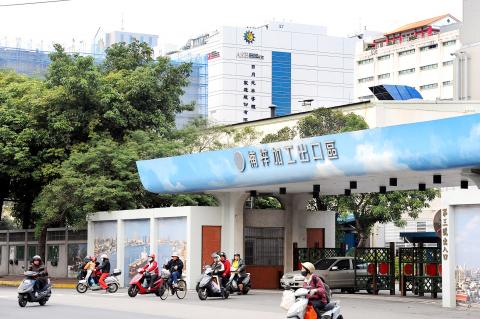Advanced Semiconductor Engineering Inc (ASE, 日月光半導體) yesterday said that a government order to shut down some facilities at its K7 plant in Greater Kaohsiung may result in a monthly loss of up to US$18 million.
The factory, in Greater Kaohsiung’s Nanzih Export Processing Zone, accounts for about 9 percent of the company’s monthly sales, the world’s biggest chip packager said.
While expressing regret over the order to shut down, ASE said it would continue paying the salaries of the 5,000 workers at the K7 plant and safeguard employment-related rights.

Photo: Chang Chung-yi, Taipei Times
“The company regrets the decision of the Greater Kaohsiung Government’s Environmental Protection Bureau,” ASE chief financial officer Joseph Tung (董宏思) told a press conference.
“ASE will address its mismanagement problems in the shortest time possible and apply to the bureau for resumption of operations afterward,” Tung said.
In the meantime, the company has sought legal solutions and assigned lawyers to figure out the bureau’s decision, he added.
Addressing market concern that clients might switch orders, ASE said it had explained the situation to clients, emphasizing that production remains under control despite the suspension of K7.
In a report released on Monday, JPMorgan Securities Taiwan Ltd said that ASE would still be able to provide sufficient flip-chip and wire-bonding packaging services to clients, in the case of K7’s closure.
However, JPMorgan said that some clients that have contracted ASE for fabless chip design services might switch some of the orders to Taiwan Semiconductor Manufacturing Co (台積電), Siliconware Precision Industries Co (矽品精密) or Amkor Technology Inc of South Korea, since up to 60 percent of ASE’s wafer-bumping capacity comes from K7.
“Since most of the wafer bumping orders are multi-sourced, this could move away quickly if K7 is suspended,” JPMorgan said in a note.
Meanwhile, the Ministry of Economic Affairs yesterday called on ASE to comply with labor laws and ensure that workers’ rights are safeguarded during K7’s shutdown.
The ministry said in a statement that it respects the local environmental protection bureau’s decision and would continue offering assistance to ASE to help it resume operations as soon as possible.
Following ASE’s submission of a proposal to the Export Processing Zone Administration on Thursday, the ministry has established a task force aimed at helping the company improve its wastewater management, the ministry said.
Given that ASE is the world’s biggest chip packager and plays an important role in the country’s semiconductor industry, the ministry said it may ask other local chip packagers if they could fill in should there be a production shortfall.
ASE reported a net profit of NT$16.6 billion on sales of NT$194 billion last year. The company counts TSMC, MediaTek Inc (聯發科) and Qualcomm Inc among its major clients.
ASE shares closed unchanged at NT$27.25 yesterday.

To many, Tatu City on the outskirts of Nairobi looks like a success. The first city entirely built by a private company to be operational in east Africa, with about 25,000 people living and working there, it accounts for about two-thirds of all foreign investment in Kenya. Its low-tax status has attracted more than 100 businesses including Heineken, coffee brand Dormans, and the biggest call-center and cold-chain transport firms in the region. However, to some local politicians, Tatu City has looked more like a target for extortion. A parade of governors have demanded land worth millions of dollars in exchange

An Indonesian animated movie is smashing regional box office records and could be set for wider success as it prepares to open beyond the Southeast Asian archipelago’s silver screens. Jumbo — a film based on the adventures of main character, Don, a large orphaned Indonesian boy facing bullying at school — last month became the highest-grossing Southeast Asian animated film, raking in more than US$8 million. Released at the end of March to coincide with the Eid holidays after the Islamic fasting month of Ramadan, the movie has hit 8 million ticket sales, the third-highest in Indonesian cinema history, Film

Taiwan Semiconductor Manufacturing Co’s (TSMC, 台積電) revenue jumped 48 percent last month, underscoring how electronics firms scrambled to acquire essential components before global tariffs took effect. The main chipmaker for Apple Inc and Nvidia Corp reported monthly sales of NT$349.6 billion (US$11.6 billion). That compares with the average analysts’ estimate for a 38 percent rise in second-quarter revenue. US President Donald Trump’s trade war is prompting economists to retool GDP forecasts worldwide, casting doubt over the outlook for everything from iPhone demand to computing and datacenter construction. However, TSMC — a barometer for global tech spending given its central role in the

Alchip Technologies Ltd (世芯), an application-specific integrated circuit (ASIC) designer specializing in server chips, expects revenue to decline this year due to sagging demand for 5-nanometer artificial intelligence (AI) chips from a North America-based major customer, a company executive said yesterday. That would be the first contraction in revenue for Alchip as it has been enjoying strong revenue growth over the past few years, benefiting from cloud-service providers’ moves to reduce dependence on Nvidia Corp’s expensive AI chips by building their own AI accelerator by outsourcing chip design. The 5-nanometer chip was supposed to be a new growth engine as the lifecycle